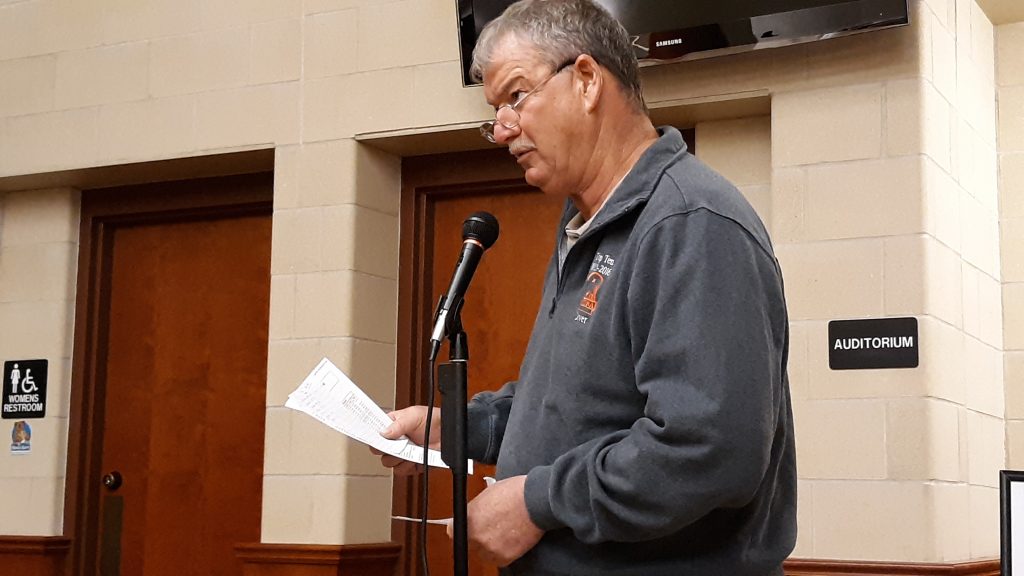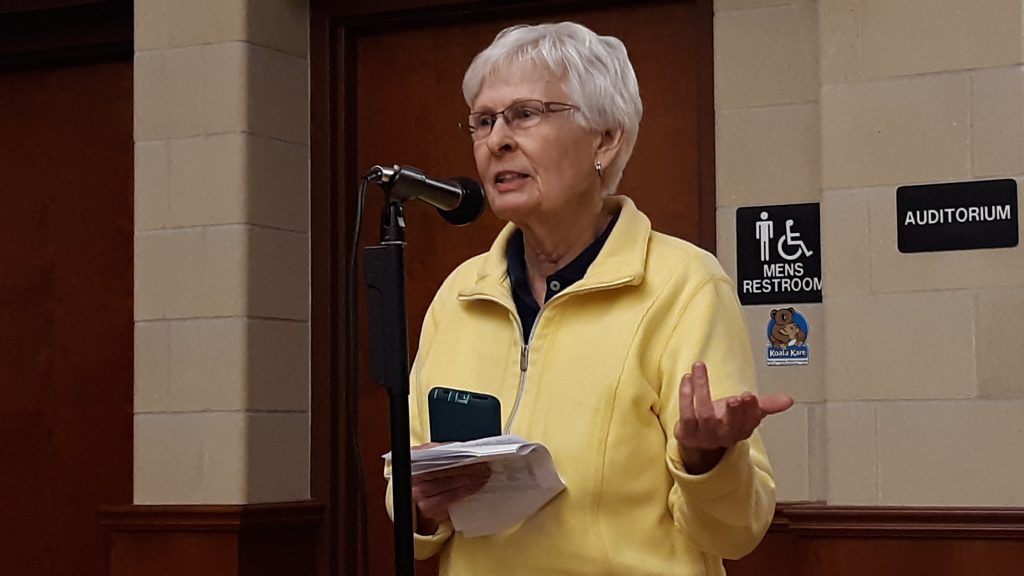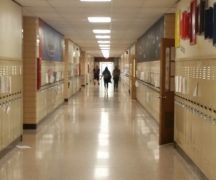By JAN LARSON McLAUGHLIN
BG Independent News
Bowling Green School District officials want to get the word out – the two renewal levies on the March 17 ballot will not cost taxpayers any more money. The emphasis is on “no new money.”
So when Treasurer Cathy Schuller presented an overview of the levies at Tuesday’s school board meeting, she focused on that fact.
“Neither issue is going to cost taxpayers any more than what they are paying now,” she said.
The two levies are a renewal of a 4.2-mill current expense levy, and renewal of a $1 million substitute emergency levy – both for a continuing period of time – to be used for school operating expenses.
The Bowling Green district has not passed a levy for new money for 10 years. “Which is almost unheard of in a school district,” Schuller said.

But one citizen at the school board meeting objected to the “no new money” phrase. Richard Chamberlain said when the substitute levy collects taxes on a new house built down the street from him, he will no longer get a reduction in his taxes. So while he won’t pay more, Chamberlain objected to the fact that he won’t see his taxes go down.
Voters in the Bowling Green district have consistently passed renewal operating levies. However, these will be a little different since the board is also asking the voters to approve them for a continuing period.
If the voters reject the levies based on their continuing status, the board would not be able to renew them – and Homestead rollback benefits would be lost for taxpayers.
In 2013, the state decided to stop paying the 12.5 percent rollback on school levies – leaving the entire bill for taxpayers to foot. But by renewing existing levies, the district can preserve the rollbacks.
There are other upsides to turning the five-year levies into continuing levies, Schuller said.
First, the district could reduce the number of times it has to ask voters for the same money. Without changing the taxing structure, the district may face 20 ballots over the next 25 years.
Second, having continuing levy support would help the district’s five-year forecast. Since that income would then be guaranteed, the district could get by with lower reserves. Right now, without continuing levy support, the district should not allow its balance to go below $8 million, according to the district’s financial advisor, David Conley.
The district’s temporary levies account for 21 percent of the total general fund budget for the schools, Schuller said.
Third, having continuing levies would allow for more precise long-term planning.
Other benefits of continuing levies include higher bond ratings, and the ability to capture tax revenue on new development in the district.
At Tuesday’s meeting, Chamberlain questioned the large balance held by the district. He asked to see proof of the district needing the sizable balance.
“If you folks could help me with that, I’d be tickled to death,” he said.
That large of a general fund balance is necessary since the district is so heavily dependent on term-limited levies that rely on voter approval every few years, Conley had explained at a previous meeting.
The state requires that type of balance, he said. If the district failed to renew a levy, or a recession hits, that balance could quickly be wiped out. However, the district could survive with a much smaller safety net if it changed to a less risky tax structure – and passing continuing levies is one way to do that.
“We need to have it as a rainy day fund,” board member Norm Geer said.
But if the continuing levies are passed, the district will be able to use some of that balance in the classrooms, he said.
“We’ve been tightening our belt, and we have needs,” Geer said.
Schuller listed the following advantages to renewing the levies and making them continuing:
- Preserves the Homestead rollback discount to taxpayers. If the levies aren’t renewed, taxpayers will lose the 12.5% Homestead rollbacks when the district has to come back with a new request.
- Continuing levies reduce voter fatigue. As the levies are now, the district has to ask for voter approval every three years.
- Allows the district to plan more effectively knowing these monies are available.
- Permits the district to reduce the need of maintaining a higher fund balance, and thus spend that money in the classrooms.
- The district has to pay a fee to place levies on the ballot every time, at a cost to taxpayers.
According to Schuller, the district was charged $21,861 for election expenses in 2017. That is over half of a new teacher’s salary, she said. Over a 10-year period, the district will spend as much as $100,000 on elections unless some levies become continuing, she said.
And Geer stressed, “This is not new money.”

Also at Tuesday’s meeting, the board:
- Recognized Safety Kids Calendar Contest winners Katelyn Barnhart, Lacey Richter, Emily Myers and Aiden Meyer.
- Welcomed new board member Tracy Hovest, who teaches at Washington Local School and has a daughter in BG schools.
- Heard from Superintendent Francis Scruci that he attended a “Civility Matters” conference recently in Dayton. The conference covers how to reduce bullying, disrespectful conduct, and teen suicides by working with the schools, families and businesses. Scruci is hoping to bring the conference to Bowling Green.
- Was awarded certificates from Scruci for Board Recognition Month. “You’re impacting students’ lives,” he told them.
- Listened as Janet Parks praised the board’s efforts. “I thank you for your commitment to our schools, our students and our facilities. It’s not easy, I know,” she said.
- Heard from Hovest that the annual Trivia Night fundraiser is scheduled for March 14. The event helps pay for scholarships and mini grants to classrooms.
- Learned that more than $23,900 was donated to the district last month for items like elementary camp, scholarships, school trips, Model UN, the orchestra and art club. A total of $4,143 to erase student lunch debt was donated by the Annual Snyder Christmas Gathering, memorials for Kathleen Ferrell, and the Mileti Center at BGSU.





